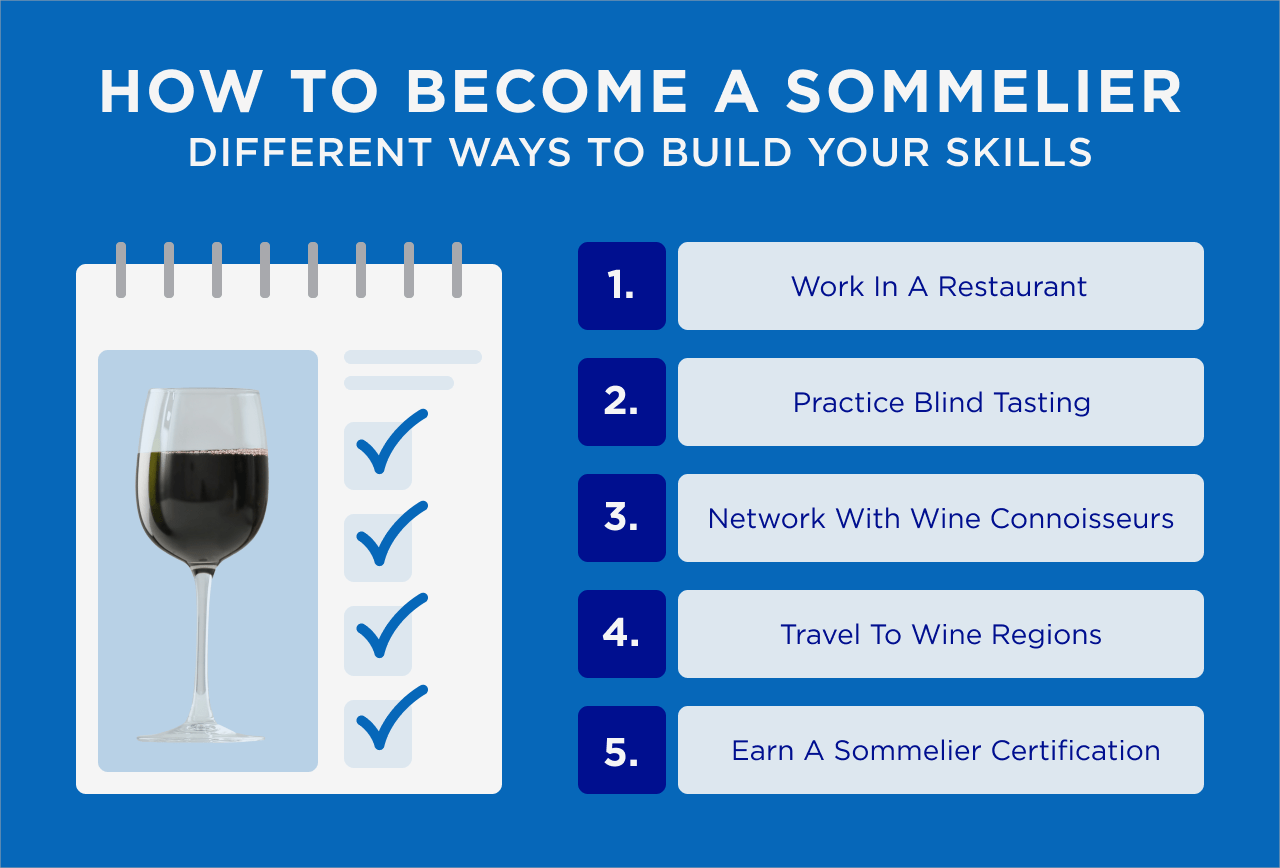How to Become a Sommelier
Does your fascination with the wine industry go beyond the basic knowledge of wine and leisurely sipping? Maybe you’ve even considered leveling up your expertise with an official sommelier certification.
In this article, we’re exploring everything it takes to become a sommelier and how you can be on your way to becoming one!

What is a Sommelier?
The word "sommelier" means "wine steward" and was first used in France in 1829. It derives from the Old French word "sommier" which referred to a "beast of burden." This couldn’t be more accurate as becoming a wine connoisseur, learning the ins and outs of wine tasting, understanding different wine regions, and taking some tough exams is no small feat.
Anyone can have a successful sommelier career. Like any venture, it will take time and effort, but getting started is much easier than you think.
What Does a Sommelier Do?
Once they've earned their certification or gained enough industry experience, sommeliers can become the resident wine expert in a restaurant, work at a wine shop or an upscale wine bar, or even offer their expertise as wine consultants for Michelin Star restaurants, bridging the gap between wine producers and consumers. Some chefs also hold sommelier certifications to master the art of pairing food and wine perfectly.
The most common role for a sommelier is in the restaurant scene. Here, they wear multiple hats, managing wine storage, curating impressive wine lists, serving guests with finesse, and educating the restaurant staff about all things wine.
Now that you have a glimpse of what sommeliers do, let's explore some of the salary potential.
How Much Do Sommeliers Earn?
Sommeliers enjoy a wide range of earning potential, with salaries ranging from $40,000 to $100,000. The actual figures depend on factors such as location, experience, and more. Those who attain the coveted title of master sommelier often earn six-figure salaries.
Sommeliers with standard certification can expect an average annual income of approximately $84,000, depending on the city they work in. However, most sommeliers typically earn between $40,000 and $60,000 per year.
Now that we know what a sommelier does and how much they earn, here are some of the steps you could take to start your sommelier career.

How to Become a Wine Expert
With so many ways to become a sommelier, here are just a few things you can do to get started.
Work in a Restaurant
It's a common misconception that you must enroll in a certification program to become a sommelier. But did you know that many working sommeliers don't have a certification? Skip the sommelier courses for now and start learning everything you can about the world of wine. Keep in mind that you may need to work from the ground up, working in a wine cellar or starting as a server.
Eventually, you may be able to become a wine director, who is responsible for curating and managing wine programs in a dining establishment. The hospitality industry has so many opportunities to start learning about wine; it's a great way to start.

Practice Blind Tasting
One of the requirements for becoming a great sommelier is understanding wine's taste, aromas, food, and wine pairings, serving temperature, grape varieties, and important information regarding the wine's origins.
You may need to practice tasting on a consistent basis, and some wine experts suggest sampling a case of wine a month.
Take a trip to your local wine seller or find an online retailer you enjoy. You can even ask the local seller which wines they suggest or where to start.
When you feel confident, practice blind tasting on your own or invite a friend to quiz you. You can host a dinner party and practice wine and food pairings in real-time.
Network With Fellow Wine Connoisseurs
If you're not ready to start working in the industry immediately but still want to get plugged in, visit a wine bar, follow local wine vendors, or check out local wine-tasting events. Making friends in the industry is one of the best ways to turn your hobby into a possible career.
Travel to Wine Regions
If you are able to travel, another way to absorb an array of knowledge is to visit locations where wine culture is prevalent. If you live in the United States, Napa Valley in California, Oregon, and Washington boast thriving wine communities, so you may not even have to travel far depending on where you're located.
Earn a Sommelier Certification
If you still want to take your wine education to the next level and are ready to invest in wine certifications, attending a wine school could be the right option.
If your goal is to earn your Master Sommelier Diploma, you will need to pass four levels, each level becoming more rigorous as you advance.
Sommelier Levels
- L1 (Level One): This level is mainly theory-based and requires basic, introductory knowledge of regions and tasting notes.
- L2 (Level Two): Foundational certificates in wines and spirits. You will need to exhibit blind-tasting skills and table service.
- L3 (Level 3): The Advanced Sommelier Exam, which requires advanced wine knowledge involving origins and terroir, followed by more blind tasting.
- L4 (Level 4): The master sommelier degree - only 10% of wine experts hold this certification.
If you live in the United States, Wine and Spirit Education Trust (WSET), National Wine School (NWS, and the Court of Master Sommeliers Americas all offer in-person and online courses.

Interested in Becoming a Sommelier?
Now that you have a better understanding of how to become a steward of wine, are you ready to take the next step?
If you’d like to enrich your wine knowledge further, check out our Podcast and Wine Online 101 for everything related to the world of wine.
As a leader in the alcohol e-commerce wine industry, we can’t wait to share our expert knowledge with you.